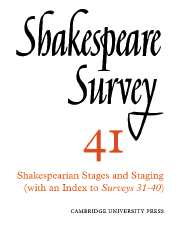Book contents
- Frontmatter
- The Shakespearian Stages, Forty Years On
- The Original Staging of The First Part of the Contention (1594)
- Charles Calvert’s Henry V
- Hamlet, An Apology for Actors, and The Sign of the Globe
- ‘Hid indeed within the centre’: The Hall/Finney Hamlet
- Malvolio and the Dark House
- The Text of Cressida and Every Ticklish Reader: Troilus and Cressida, The Greek Camp Scene
- Antony and Cleopatra, Act 4 Scene 16: ‘A Heavy Sight’
- The Tempest’s Tempest at Blackfriars
- Keats and Lucrece
- The Resources of Characterization in Othello
- Ovid and the Mature Tragedies: Metamorphosis in Othello and King Lear
- The Passing of King Lear
- Shakespeare Performances in London and Stratford-upon-Avon, 1986–7
- Professional Shakespeare Productions in the British Isles, January–December 1986
- The Year's Contributions to Shakespeare Studies: 1 Critical Studies
- 2 Shakespeare’s Life, Times, and Stage
- 3 Editions and Textual Studies
- Books Received
- Index to Volume 41
- General Index to Volumes 31-40
Ovid and the Mature Tragedies: Metamorphosis in Othello and King Lear
Published online by Cambridge University Press: 28 March 2007
- Frontmatter
- The Shakespearian Stages, Forty Years On
- The Original Staging of The First Part of the Contention (1594)
- Charles Calvert’s Henry V
- Hamlet, An Apology for Actors, and The Sign of the Globe
- ‘Hid indeed within the centre’: The Hall/Finney Hamlet
- Malvolio and the Dark House
- The Text of Cressida and Every Ticklish Reader: Troilus and Cressida, The Greek Camp Scene
- Antony and Cleopatra, Act 4 Scene 16: ‘A Heavy Sight’
- The Tempest’s Tempest at Blackfriars
- Keats and Lucrece
- The Resources of Characterization in Othello
- Ovid and the Mature Tragedies: Metamorphosis in Othello and King Lear
- The Passing of King Lear
- Shakespeare Performances in London and Stratford-upon-Avon, 1986–7
- Professional Shakespeare Productions in the British Isles, January–December 1986
- The Year's Contributions to Shakespeare Studies: 1 Critical Studies
- 2 Shakespeare’s Life, Times, and Stage
- 3 Editions and Textual Studies
- Books Received
- Index to Volume 41
- General Index to Volumes 31-40
Summary
The orthodox account of the relationship between Shakespeare and his favourite classical poet, Ovid, proposes that it was explicit early in his career when his schoolboy reading of the Metamorphoses was fresh in his mind (thus Titus Andronicus, Venus and Adonis, and Lucrece are his most overtly Ovidian works), implicit in the metamorphic art of the comedies (A Midsummer Night's Dream especially), and profoundly reawakened in the late romances. Put like this, there is an obvious gap which has occasioned surprisingly little critical attention: are we to suppose that an influence the importance of which was second to none early and late in Shakespeare's career was non-existent or dormant in the middle of it? This essay, which represents work in progress towards a full-scale revaluation of the question of Shakespeare and Ovid, uses Othello and King Lear as test cases in an attempt to read the mature tragedies in Ovidian terms.
One reason for the neglect of the tragedies' Ovidianism is the fact that the Metamorphoses tend to bring to mind the golden age, with its associations of the forest, the springtime, leisure, youth, and love. But Ovid described the age of iron too, and the language in which he does so may suggest to us the world of Shakespeare's tragedies.
- Type
- Chapter
- Information
- Shakespeare Survey , pp. 133 - 144Publisher: Cambridge University PressPrint publication year: 1989
- 3
- Cited by



